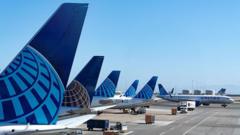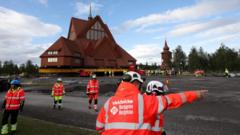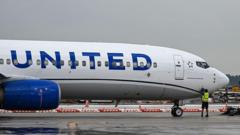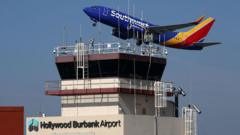On April 28, air traffic controllers at Newark Liberty International Airport experienced a brief loss of communication for approximately 30 seconds, causing significant disruptions including hundreds of flight delays and cancellations. The incident highlights ongoing staff shortages and an aged air traffic control system, prompting federal officials to seek comprehensive reforms.
Newark Air Traffic Controllers Experience Communication Breakdown: Flight Delays Follow
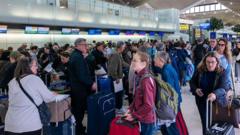
Newark Air Traffic Controllers Experience Communication Breakdown: Flight Delays Follow
A recent incident at Newark Liberty International Airport has raised concerns over air traffic control reliability, leading to several canceled flights and controller trauma leave.
Air traffic controllers at Newark Liberty International Airport, one of New York's busiest aviation hubs, encountered a serious disruption last week, as contact with planes under their control was temporarily lost. The incident, which occurred on April 28, lasted for approximately 30 seconds, during which controllers reported being “unable to see, hear, or talk to” the aircraft. This communication failure has led to a significant fallout, including a wave of trauma leave among employees and numerous flight disruptions.
US Transportation Secretary Sean Duffy confirmed the communication breakdown but reassured the public that there was no immediate threat to flight safety. "Now were planes going to crash? No," Duffy stated, emphasizing that aircraft are equipped with their own communication devices. Nevertheless, the incident raised alarms regarding the fragility of the current air traffic management system, which the Department of Transportation and the Federal Aviation Administration (FAA) have acknowledged as being outdated and in dire need of upgrades.
In the wake of the communication lapse, Newark airport saw over 150 flights canceled on Monday alone, reflecting a growing pattern of air traffic issues linked to controller shortages. These shortages have been exacerbated by the recent trauma leave taken by employees following the incident, as detailed by the National Air Traffic Controllers Association, although the union has not disclosed specific numbers. Furthermore, United Airlines announced that it would be canceling 35 flights per day due to the airport's inability to manage the scheduled air traffic effectively.
Duffy and the FAA have recognized the pressing need for reform, with plans in place to recruit an additional 2,000 air traffic controllers this year. The department aims to secure substantial funding from Congress to completely overhaul the current system, investing in new technology and infrastructure to ensure a safer, more reliable air traffic management environment.
As federal initiatives unfold, the air travel community watches closely, hoping for improvements that will address not only the staffing concerns but also the essential infrastructure that supports air safety and efficiency.

